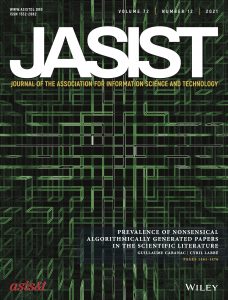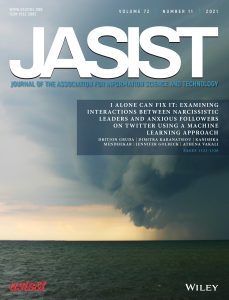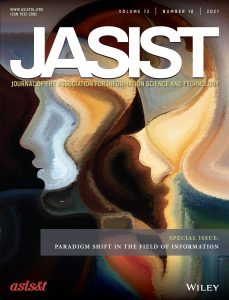New From JASIST
 JASIST Volume 72, Issue 12, December 2021
JASIST Volume 72, Issue 12, December 2021
RESEARCH ARTICLES
Prevalence of nonsensical algorithmically generated papers in the scientific literature
Guillaume Cabanac, Cyril Labbé
A taxonomy, data set, and benchmark for detecting and classifying malevolent dialogue responses
Yangjun Zhang, Pengjie Ren, Maarten de Rijke
Pnina Fichman, Matthew Vaughn
Genre analysis of movies using a topic model of plot summaries
Paul Matthews, Kathrina Glitre
How do makers obtain information for their makerspace projects?
Árni Már Einarsson, Morten Hertzum
Male or female gender-polarized YouTube videos are less viewed
Mike Thelwall, David Foster
Predicting crowdfunding project success based on backers' language preferences
Qianzhou Du, Jing Li, Yanqing Du, G. Alan Wang, Weiguo Fan
Chern Li Liew, Jamie Yeates, Spencer Charles Lilley
Whether or when: The question on the use of theories in data science
Fred Fonseca
BOOK REVIEW
Joacim Hansson
 JASIST Volume 72, Issue 11, November 2021
JASIST Volume 72, Issue 11, November 2021
RESEARCH ARTICLES
Dritjon Gruda, Dimitra Karanatsiou, Kanishka Mendhekar, Jennifer Golbeck, Athena Vakali
Bryan Stephens, Jonathon N. Cummings
Yubing Tian, Ricardo Gomez, Marika Cifor, James Wilson, Henry Morgan
Wei-Ning Cheng, Christopher S. G. Khoo
Chaojiang Wu, Erjia Yan, Yongjun Zhu, Kai Li
James A. Hodges
Stefan Reichmann, Thomas Klebel, Ilire Hasani-Mavriqi, Tony Ross-Hellauer
Lexical data augmentation for sentiment analysis
Rong Xiang, Emmanuele Chersoni, Qin Lu, Chu-Ren Huang, Wenjie Li, Yunfei Long
BRIEF COMMUNICATION
Shiyang Lai, Ningyuan Fan
BOOK REVIEW
Kalpana Shankar
 JASIST Volume 72, Issue 10, October 2021
JASIST Volume 72, Issue 10, October 2021
Special Issue: Paradigm Shift in the Field of Information
EDITORIAL
Paradigm shift in the field of information special issue editorial
Rong Tang, Bharat Mehra, Jia Tina Du, Yuxiang (Chris) Zhao
RESEARCH ARTICLES
Storytelling wisdom: Story, information, and DIKW
Kate McDowell
Hashtags for gatekeeping of information on social media
Devendra Potnis, Iman Tahamtan
Adam Worrall, Alicia Cappello, Rachel Osolen
Holistic information research: From rhetoric to paradigm
Sarah Polkinghorne, Lisa M. Given
Everyone everywhere: A distributed and embedded paradigm for usability
Michael B. Twidale, David M. Nichols, Christopher P. Lueg
Nicole A. Cooke, Vanessa L. Kitzie
Understanding information: Adding a non-individualistic lens
Yuanye Ma
Beth Patin, Melinda Sebastian, Jieun Yeon, Danielle Bertolini, Alexandra Grimm
The evolution and shift of research topics and methods in library and information science
Jinxuan Ma, Brady Lund
Emerging (information) realities and epistemic injustice
Tami Oliphant
